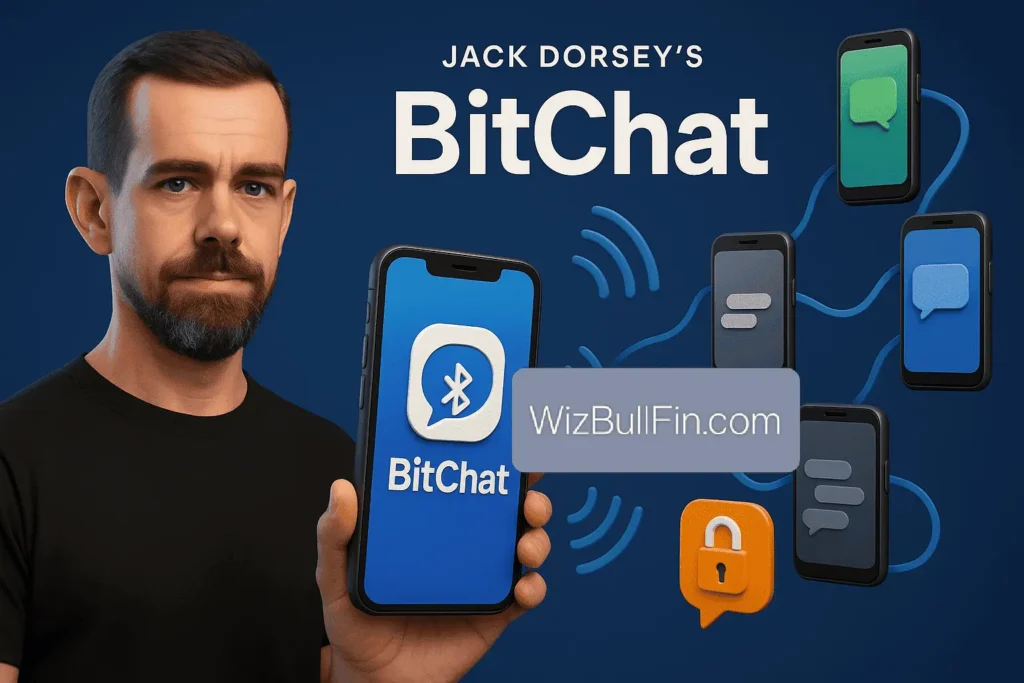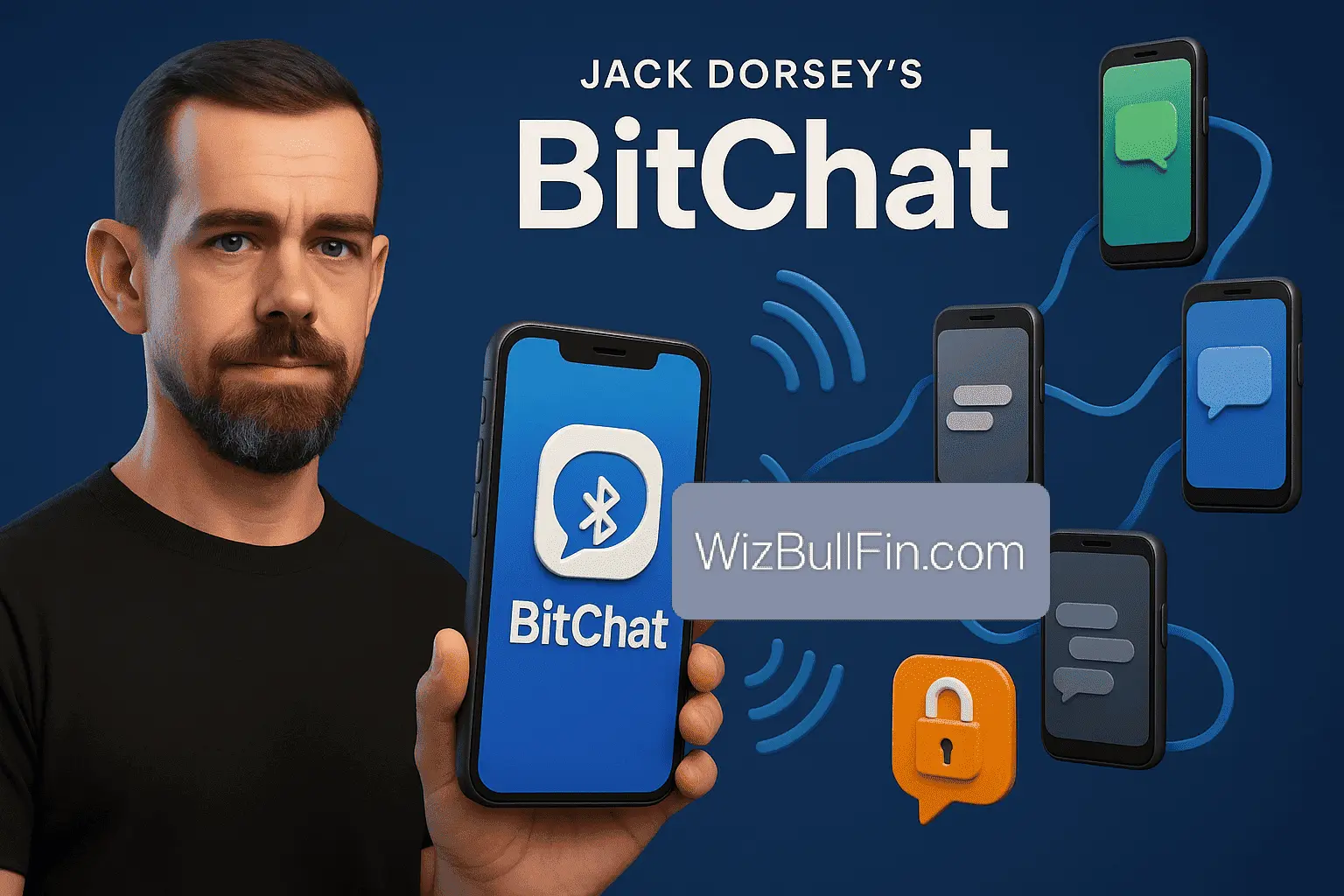In a world increasingly dependent on internet connectivity and cellular infrastructure, a new innovation is challenging the status quo — BitChat, a breakthrough messaging platform introduced by Jack Dorsey, the founder of Twitter and Square. What sets BitChat apart? It doesn’t use the internet, mobile data, or even Wi-Fi. Instead, it leverages Bluetooth Low Energy (BLE) to allow smartphones to communicate directly with each other. This simple yet powerful idea could potentially redefine how we stay connected, especially in areas with unreliable or no internet access.

What Is BitChat?
BitChat is a decentralized messaging app that enables peer-to-peer communication without relying on traditional telecom or internet infrastructure. It works by turning every smartphone into a node in a Bluetooth-powered mesh network. This means your phone can directly communicate with another nearby phone, and also help relay messages to others beyond Bluetooth range by “hopping” the message across multiple devices in the network.
In essence, BitChat creates a self-sufficient communication ecosystem. If scaled widely, this could transform how we think about digital connectivity, privacy, and independence from centralized infrastructure.
How BitChat Works – The Technology Behind It
BitChat operates on a clever blend of Bluetooth Low Energy (BLE) technology and mesh networking principles.
Here’s a step-by-step breakdown of how it works:
- Message Creation and Compression:When a user sends a message via BitChat, the app uses LZ4, a fast, lossless data compression algorithm, to split the message into tiny packets. This ensures the data remains intact but fits within BLE’s strict payload limits.
- BLE Broadcasting:The message packets are then transmitted using BLE advertising. These are short, low-power broadcast signals with a 31-byte limit—ideal for small, lightweight data transmissions over Bluetooth.
- Direct or Mesh-Based Delivery:If the recipient is within Bluetooth range (around 30 meters), their phone picks up the signal directly and reconstructs the message.If not, BitChat uses nearby devices running the app to act as relays. These devices forward the message chunks using their own Bluetooth signals. The message hops from one phone to another until it reaches the intended user, forming a BLE mesh network.
- Privacy and Security:Every BitChat message is end-to-end encrypted, meaning only the sender and the recipient can access the content. Additionally, the data is stored only in RAM, never written to disk, and each packet has a Time-To-Live (TTL) setting. This means messages expire automatically after a short period, enhancing user privacy and minimizing memory usage.
Why BitChat Matters – Real-World Applications
The vision behind BitChat goes beyond just creating a cool new chat app. It addresses real-world challenges that mainstream platforms have ignored.
- Disaster Communication
During natural disasters like earthquakes, hurricanes, or floods, internet and cellular infrastructure are often the first to fail. In such situations, BitChat enables people to communicate locally and even relay messages to rescue teams without any central network.
- Remote or Underserved Regions
Millions of people live in areas where internet access is limited, unreliable, or unaffordable. BitChat allows them to form local networks to communicate securely, share information, and even organize community activities — all without spending a dime on data.
- Privacy-Conscious Messaging
In an age where online privacy is increasingly compromised, BitChat offers a truly private alternative. Since there are no servers, no logs, and no central authority, the app is ideal for whistleblowers, journalists, activists, and anyone who values communication security.
- Protests and Political Unrest
In regions where governments shut down internet access during protests or political unrest, BitChat becomes a lifeline. Its decentralized and censorship-resistant nature allows people to stay connected and organize without surveillance or interference.
Limitations of BitChat
While the idea is revolutionary, BitChat isn’t without its limitations:
Short Range: BLE typically supports up to 30 meters in open space. For messages to travel longer distances, they must rely on a chain of active devices in between.
Density Dependent: The effectiveness of the mesh network depends on network density. If too few users have BitChat installed in an area, message delivery may be delayed or even fail.
RAM-Only Storage: While great for privacy, this approach makes message persistence temporary. If a phone restarts, unsent or unreceived messages are lost.
Still, these trade-offs are minor when weighed against the benefits of independence, privacy, and resilience in crisis scenarios.
BitChat vs Traditional Messaging Apps
Let’s look at how BitChat stacks up against traditional messaging apps like WhatsApp, Telegram, or Signal.
Feature BitChat WhatsApp / Telegram / Signal
Internet Required No Yes
Cellular Required No Yes
End-to-End Encryption Yes Yes
Server Dependency No (decentralized) Yes (centralized)
Offline Messaging Yes (via mesh) No
Data Storage RAM only, ephemeral Persistent, cloud/backups
Privacy Extremely high Moderate to high
This comparison shows how BitChat caters to use cases where mainstream apps fail or cannot operate.
The Bigger Picture: Decentralizing Communication
Jack Dorsey has long been a proponent of decentralization, as evident from his work on the Bluesky project and advocacy for open social protocols. With BitChat, he takes that philosophy further — beyond social media and into real-time communication.
This aligns with a broader movement to democratize digital infrastructure — removing the gatekeepers, reducing dependency on Big Tech, and empowering individuals.
If BitChat reaches a critical mass of users — especially in densely populated or tech-savvy regions — it could fundamentally alter how we stay connected. Imagine stadiums, conferences, college campuses, or urban neighborhoods forming local mesh networks where information flows freely and securely, independent of telecom monopolies or government censorship.
Final Thoughts: Is BitChat the Future?
BitChat may not replace WhatsApp or iMessage tomorrow, but it introduces a vital new dimension to personal communication — resilience, privacy, and independence. It doesn’t aim to compete with existing platforms directly but to fill the communication gaps they leave behind.
As climate change, cyberattacks, and political instability continue to threaten traditional infrastructure, tools like BitChat could become essential. If you’re someone who values privacy, self-reliance, or simply wants to be prepared for emergencies, BitChat is well worth a try.
In Conclusion:
BitChat is a decentralized Bluetooth messaging app developed by Jack Dorsey, requiring no internet or cellular network.
It uses BLE mesh networking and LZ4 compression to send encrypted messages across peer devices.
It’s ideal for emergency use, privacy-conscious users, and internet-deprived regions.
With growing awareness, BitChat has the potential to democratize communication infrastructure and reshape the messaging landscape.
Download BitChat, start a conversation, and be a node in a future-proof network.
